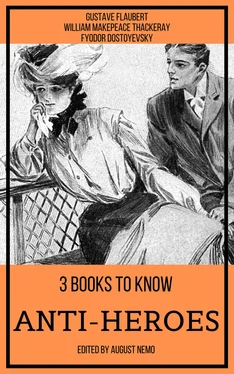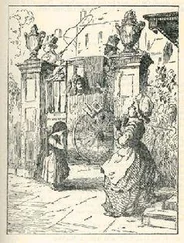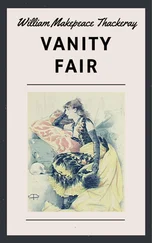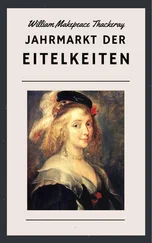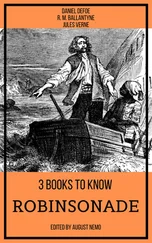‘“Dear Heaven!” says the landlord, “we saw you go away three hours ago!”
‘“ME!” says I; “why, man, I have been in bed all the morning. I am ill—I have taken physic—I have not left the house this morning! Where is that scoundrel Ambrose? But, stop! where are my clothes and wig?” for I was standing before them in my chamber-gown and stockings, with my nightcap on.
‘“I have it—I have it!” says a little chambermaid: “Ambrose is off in your honour’s dress.”
‘“And my money—my money!” says I; “where is my purse with forty-eight Frederics in it? But we have one of the villains left. Officers, seize him!”
‘“It’s the young Herr von Potzdorff!” says the landlord, more and more astonished.
‘“What! a gentleman breaking open my trunk with hammer and chisel—impossible!”
‘Herr von Potzdorff was returning to life by this time, with a swelling on his skull as big as a saucepan; and the officers carried him off, and the judge who was sent for dressed a proces verbal of the matter, and I demanded a copy of it, which I sent forthwith to my ambassador.
‘I was kept a prisoner to my room the next day, and a judge, a general, and a host of lawyers, officers, and officials, were set upon me to bully, perplex, threaten, and cajole me. I said it was true you had told me that you had been kidnapped into the service, that I thought you were released from it, and that I had you with the best recommendations. I appealed to my Minister, who was bound to come to my aid; and, to make a long story short, poor Potzdorff is now on his way to Spandau; and his uncle, the elder Potzdorff, has brought me five hundred louis, with a humble request that I would leave Berlin forthwith, and hush up this painful matter.
‘I shall be with you at the “Three Crowns” the day after you receive this. Ask Mr. Lumpit to dinner. Do not spare your money—you are my son. Everybody in Dresden knows your loving uncle,
‘THE CHEVALIER DE BALIBARI.’
And by these wonderful circumstances I was once more free again: and I kept my resolution then made, never to fall more into the hands of any recruiter, and henceforth and for ever to be a gentleman.
With this sum of money, and a good run of luck which ensued presently, we were enabled to make no ungenteel figure. My uncle speedily joined me at the inn at Dresden, where, under pretence of illness, I had kept quiet until his arrival; and, as the Chevalier de Balibari was in particular good odour at the Court of Dresden (having been an intimate acquaintance of the late monarch, the Elector, King of Poland, the most dissolute and agreeable of European princes), I was speedily in the very best society of the Saxon capital: where I may say that my own person and manners, and the singularity of the adventures in which I had been a hero, made me especially welcome. There was not a party of the nobility to which the two gentlemen of Balibari were not invited. I had the honour of kissing hands and being graciously received at Court by the Elector, and I wrote home to my mother such a flaming description of my prosperity, that the good soul very nearly forgot her celestial welfare and her confessor, the Reverend Joshua Jowls, in order to come after me to Germany; but travelling was very difficult in those days, and so we were spared the arrival of the good lady.
I think the soul of Harry Barry, my father, who was always so genteel in his turn of mind, must have rejoiced to see the position which I now occupied; all the women anxious to receive me, all the men in a fury; hobnobbing with dukes and counts at supper, dancing minuets with high-well-born baronesses (as they absurdly call themselves in Germany), with lovely excellencies, nay, with highnesses and transparencies themselves: who could compete with the gallant young Irish noble? who would suppose that seven weeks before I had been a common—bah! I am ashamed to think of it! One of the pleasantest moments of my life was at a grand gala at the Electoral Palace, where I had the honour of walking a polonaise with no other than the Margravine of Bayreuth, old Fritz’s own sister: old Fritz’s, whose hateful blue-baize livery I had worn, whose belts I had pipeclayed, and whose abominable rations of small beer and sauerkraut I had swallowed for five years.
Having won an English chariot from an Italian gentleman at play, my uncle had our arms painted on the panels in a more splendid way than ever, surmounted (as we were descended from the ancient kings) with an Irish crown of the most splendid size and gilding. I had this crown in lieu of a coronet engraved on a large amethyst signet-ring worn on my forefinger; and I don’t mind confessing that I used to say the jewel had been in my family for several thousand years, having originally belonged to my direct ancestor, his late Majesty King Brian Boru, or Barry. I warrant the legends of the Heralds’ College are not more authentic than mine was.
At first the Minister and the gentlemen at the English hotel used to be rather shy of us two Irish noblemen, and questioned our pretensions to rank. The Minister was a lord’s son, it is true, but he was likewise a grocer’s grandson; and so I told him at Count Lobkowitz’s masquerade. My uncle, like a noble gentleman as he was, knew the pedigree of every considerable family in Europe. He said it was the only knowledge befitting a gentleman; and when we were not at cards, we would pass hours over Gwillim or D’Hozier, reading the genealogies, learning the blazons, and making ourselves acquainted with the relationships of our class. Alas! the noble science is going into disrepute now: so are cards, without which studies and pastimes I can hardly conceive how a man of honour can exist.
My first affair of honour with a man of undoubted fashion was on the score of my nobility, with young Sir Rumford Bumford of the English embassy; my uncle at the same time sending a cartel to the Minister, who declined to come. I shot Sir Rumford in the leg, amidst the tears of joy of my uncle, who accompanied me to the ground; and I promise you that none of the young gentlemen questioned the authenticity of my pedigree, or laughed at my Irish crown again.
What a delightful life did we now lead! I knew I was born a gentleman, from the kindly way in which I took to the business: as business it certainly is. For though it SEEMS all pleasure, yet I assure any low-bred persons who may chance to read this, that we, their betters, have to work as well as they: though I did not rise until noon, yet had I not been up at play until long past midnight? Many a time have we come home to bed as the troops were marching out to early parade; and oh! it did my heart good to hear the bugles blowing the reveille before daybreak, or to see the regiments marching out to exercise, and think that I was no longer bound to that disgusting discipline, but restored to my natural station.
I came into it at once, and as if I had never done anything else all my life. I had a gentleman to wait upon me, a French friseur to dress my hair of a morning; I knew the taste of chocolate as by intuition almost, and could distinguish between the right Spanish and the French before I had been a week in my new position; I had rings on all my fingers, watches in both my fobs, canes, trinkets, and snuffboxes of all sorts, and each outvying the other in elegance. I had the finest natural taste for lace and china of any man I ever knew; I could judge a horse as well as any Jew dealer in Germany; in shooting and athletic exercises I was unrivalled; I could not spell, but I could speak German and French cleverly. I had at the least twelve suits of clothes; three richly embroidered with gold, two laced with silver, a garnet-coloured velvet pelisse lined with sable; one of French grey, silver-laced, and lined with chinchilla. I had damask morning robes. I took lessons on the guitar, and sang French catches exquisitely. Where, in fact, was there a more accomplished gentleman than Redmond de Balibari?
Читать дальше
